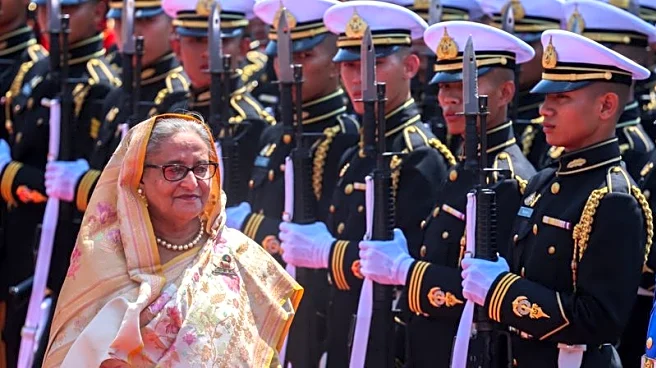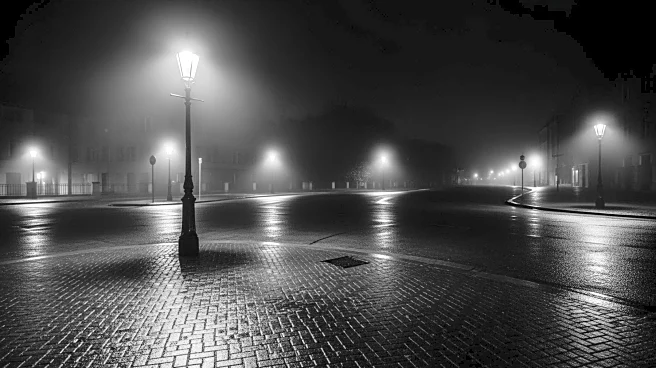By Krishna N. Das and Sam Jahan
DHAKA (Reuters) -A Bangladeshi court’s decision to sentence exiled former Prime Minister Sheikh Hasina to death has done little to heal a nation scarred by her long rule and last year’s bloody crackdown against student-led, anti-government protests.
Families of the victims want her immediate execution. The government demanded her extradition from India where she fled last year.
Her supporters have threatened unrest if her Awami League party, once the country's largest,
remains banned from elections in February, leaving Bangladesh unable to turn the page on one of its darkest chapters.
Moments after Tuesday’s ruling drew cheers in court, families of protest victims called for Hasina’s hanging. But repeated attempts to extradite her from India have stalled, straining ties between the once close partners.
Her son, Sajeeb Wazed, has warned of massive violent protests if the ban on Awami League is not lifted — a showdown that could shake the nation of 170 million, disrupt its garment exports to global brands, and jeopardise an economy reliant on a $4.7 billion IMF bailout. The 2024 protests, which the UN says killed up to 1,400 people, had already brought economic activity to a standstill.
“True justice will come only when the hangman’s rope tightens around her neck,” said Abdur Rab, whose son was killed during the protests, as he held a banner bearing a noose and the words "Killer Hasina". “Only then can we wipe this dark stain from our nation’s history.”
Hasina, who ruled Bangladesh for 20 years including 15 straight before she fled, called the verdict politically motivated "by a rigged tribunal established and presided over by an unelected government with no democratic mandate".
TIES WITH INDIA REMAIN STRAINED
The upcoming elections will mark a long-awaited return to democratic rule and are widely expected to bring the Awami League’s arch-rival, the Bangladesh Nationalist Party, back to power. The two parties have alternated rule for generations.
Meanwhile, Bangladesh's interim government, led by Nobel laureate Muhammad Yunus and representatives of student protesters, faces the task of seeking Hasina's extradition.
After the sentence was handed down, the government told India that failure to return her would be “a highly unfriendly gesture and an affront to justice”.
"Under the existing extradition treaty between the two nations, this is a binding obligation for India," Bangladesh's foreign ministry said in a statement.
But all previous efforts so far to persuade New Delhi to send her back have faltered.
New Delhi said it was committed to "the best interests of the people of Bangladesh, including in peace, democracy, inclusion and stability in that country. We will always engage constructively with all stakeholders to that end".
An Indian government source said extradition is a lengthy process requiring review of tribunal documents to ensure due procedure, fair representation, and credible testimony. India cannot act without these records, and exemptions to the treaty apply if the case appears political, the source said.
"They don't have to be best of friends, but they cannot remain at loggerheads indefinitely," said economist and political analyst Jyoti Rahman.
"And as long as Hasina remains in India, it would be difficult for the Bangladesh government to normalise the relationship. (The) Indian establishment recognises that as well. Something has to be done here."
RISKS OF VIOLENCE
Political violence surged in Dhaka ahead of the Hasina verdict, with several crude bombs exploding on Sunday and 32 blasts reported on November 12 alone, along with dozens of buses torched. Police have detained activists from Hasina's Awami League over alleged sabotage.
Hasina's son and adviser Wazed said Awami League supporters would block the national election if the ban on the party was not lifted.
"There will be massive protests ... there's going to be confrontations," he told Reuters from Washington, D.C.
"My mother is in touch with all of our party leaders and activists who are in the country. I am in touch with them. We have hundreds of thousands of activists in the country. We have millions of supporters, tens of millions. They are outraged."
The interim government said the Awami League remains under “legal proscription” for its role in the 2024 violence, and was not doing itself a favour by its "incitement to violence".
“The administration’s overriding goal is to protect life and property and ensure a peaceful environment ahead of elections,” a spokesperson said.
“Law enforcement has been instructed to act with restraint, maintain proportionality and prioritise dialogue to prevent confrontation. The priority now is stability, justice for victims, and restoring democratic governance.”
For Aman Ullah, 24, who lost his sight during the protests, justice will only come with Hasina’s hanging.
“I cannot see anymore, but the day I hear she has been hanged will be a celebration greater than Eid,” he said.
(Reporting by Krishna N. Das in New Delhi and Sam Jahan in Dhaka; Additional reporting by Shivam Patel and Sunil Kataria in New Delhi)















